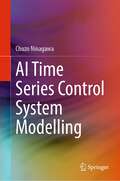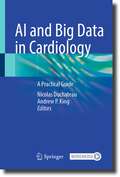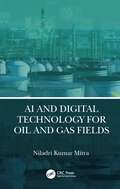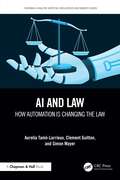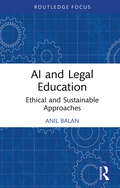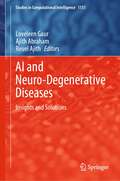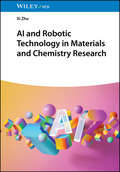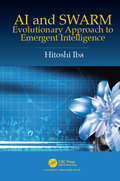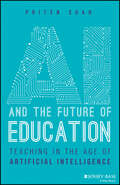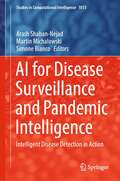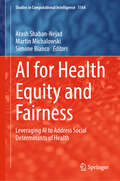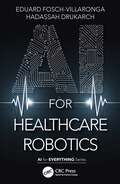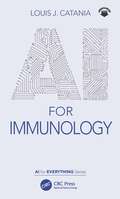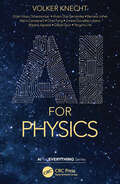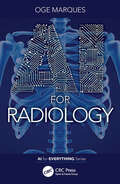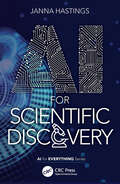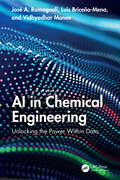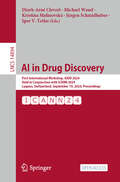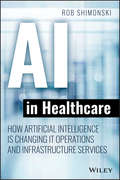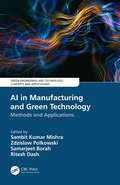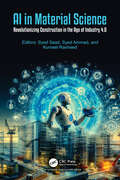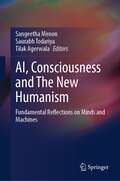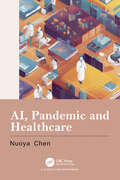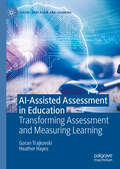- Table View
- List View
AI Time Series Control System Modelling
by Chuzo NinagawaThis book describes the practical application of artificial intelligence (AI) methods using time series data in system control. This book consistently discusses the application of machine learning to the analysis and modelling of time series data of physical quantities to be controlled in the field of system control.Since dynamic systems are not stable steady states but changing transient states, the changing transient states depend on the state history before the change. In other words, it is essential to predict the change from the present to the future based on the time history of each variable in the target system, and to manipulate the system to achieve the desired change. In short, time series is the key to the application of AI machine learning to system control. This is the philosophy of this book: "time series data" + "AI machine learning" = "new practical control methods".This book can give my helps to undergradate or graduate students, institute researchers and senior engineers whose scientific background are engineering, mathematics, physics and other natural sciences.
AI and Big Data in Cardiology: A Practical Guide
by Nicolas Duchateau Andrew P. KingThis book provides a detailed technical overview of the use and applications of artificial intelligence (AI), machine learning and big data in cardiology. Recent technological advancements in these fields mean that there is significant gain to be had in applying these methodologies into day-to-day clinical practice. Chapters feature detailed technical reviews and highlight key current challenges and limitations, along with the available techniques to address them for each topic covered. Sample data sets are also included to provide hands-on tutorials for readers using Python-based Jupyter notebooks, and are based upon real-world examples to ensure the reader can develop their confidence in applying these techniques to solve everyday clinical problems.Artificial Intelligence and Big Data in Cardiology systematically describes and technically reviews the latest applications of AI and big data within cardiology. It is ideal for use by the trainee and practicing cardiologist and informatician seeking an up-to-date resource on the topic with which to aid them in developing a thorough understanding of both basic concepts and recent advances in the field.
AI and Digital Technology for Oil and Gas Fields
by Niladri Kumar MitraThe book essentially covers the growing role of AI in the oil and gas industry, including digital technologies used in the exploration phase, customer sales service, and cloud-based digital storage of reservoir simulation data for modeling. It starts with the description of AI systems and their roles within the oil and gas industry, including the agent-based system, the impact of industrial IoT on business models, and the ethics of robotics in AI implementation. It discusses incorporating AI into operations, leading to the reduction of operating costs by localizing control functions, remote monitoring, and supervision.Features of this book are given as follows: It is an exclusive title on the application of AI and digital technology in the oil and gas industry It explains cloud data management in reservoir simulation It discusses intelligent oil and gas well completion in detail It covers marketing aspects of oil and gas business during the exploration phase It reviews development of digital systems for business purposes This book is aimed at professionals in petroleum and chemical engineering, technology, and engineering management.
AI and Law: How Automation is Changing the Law (Chapman & Hall/CRC Artificial Intelligence and Robotics Series)
by Aurelia Tamo-Larrieux Clement Guitton Simon MayerThis book provides insights into how AI is changing legal practice, government processes, and individuals’ access to those processes, encouraging each of us to consider how technological advances are changing the legal system. Particularly, and distinct from current debates on how to regulate AI, this books focuses on how the progressive merger between computational methods and legal rules changes the very structure and application of the law itself.We investigate how automation is changing the legal analysis, legal rulemaking, legal rule extraction, and application of legal rules and how this impacts individuals, policymakers, civil servants, and society at large. We show through many examples that a debate on how automation is changing the law is needed, which must revolve around the democratic legitimacy of the automation of legal processes, and be informed by the technical feasibility and tradeoffs of specific endeavors.
AI and Legal Education: Ethical and Sustainable Approaches (Routledge Research in the Law of Emerging Technologies)
by Anil BalanThis book provides a comprehensive interdisciplinary analysis of the sustainable and ethical integration of artificial intelligence (AI) within legal education, offering practical strategies for balancing innovation with ethical responsibility. Discussing the intersection of legal studies, technology and ethics, the book focuses on AI's role in reshaping professional education.With the rising demand for digital transformation in legal education and the increasing scrutiny of AI's ethical impact, this book explores the potential of AI to enhance legal learning and practice, while critically examining the challenges of data privacy, algorithmic bias and equitable access to technology. Outlining a framework for incorporating AI into the law curriculum, the book equips the readers with both cutting-edge technological skills and a deep understanding of AI’s ethical and societal implications. Drawing on a wide range of sources, including industry data and academic research, the book offers grounded, actionable guidance on implementing AI in a way that promotes inclusivity, sustainability and long-term relevance. It addresses the needs of legal education institutions, faculty and students, providing them with the tools to navigate the evolving legal landscape while maintaining ethical standards.The book will also be of interest to researchers in the fields of law, education and AI ethics.
AI and Neuro-Degenerative Diseases: Insights and Solutions (Studies in Computational Intelligence #1131)
by Ajith Abraham Loveleen Gaur Reuel AjithThis book explores the current state of healthcare practice and provides a roadmap for harnessing artificial intelligence (AI) and other modern cognitive technologies for neurogenerative diseases. The main goal of this book is to look at how these techniques can be used to classify patients with neurodegenerative diseases by extracting data from multiple modalities. It demonstrates that the growing development of computer-aided diagnosis systems has a lot of potential to help with the diagnostic process. It offers an analysis of the prospective and perils in implementing such state of the art.Progressive brain disorders with a high prevalence in the general population include Parkinson's disease, Alzheimer's disease and other types of dementia, Huntington's disease, and motor neuron disease. Worldwide, it is estimated that 33 million people have Alzheimer's disease, and 10 million people have Parkinson's disease. The global health economy is significantly impacted by these disorders, which affect both the patient and the caregivers. Various diagnostic techniques are used for differential diagnoses, such as brain imaging, EEG analysis, molecular analysis, and cognitive, psychological, and physical examination. The book aims to develop effective treatments, enhance patient quality of life, and extend life expectancy. It focuses on novel artificial intelligence approaches to clarify the pathogenesis of neurodegenerative disorders and provide early diagnosis.The authors compile recent developments based on machine learning and deep learning techniques to diagnose neurodegenerative diseases using imaging, genetic, and clinical data. The authors support initiatives and methods that aim to improve the application of algorithms in diagnostic practice.
AI and Robotic Technology in Materials and Chemistry Research
by Xi ZhuA singular resource for researchers seeking to apply artificial intelligence and robotics to materials science In AI and Robotic Technology in Materials and Chemistry Research, distinguished researcher Dr. Xi Zhu delivers an incisive and practical guide to the use of artificial intelligence and robotics in materials science and chemistry. Dr. Zhu explains the principles of AI from the perspective of a scientific researcher, including the challenges of applying the technology to chemical and biomaterials design. He offers concise interviews and surveys of highly regarded industry professionals and highlights the interdisciplinary and broad applicability of widely available AI tools like ChatGPT. The book covers computational methods and approaches from algorithms, models, and experimental data systems, and includes case studies that showcase the real-world applications of artificial intelligence and lab automation in a variety of scientific research settings from around the world. You'll also find: A thorough introduction to the challenges currently being faced by chemists and materials science researchers Comprehensive explorations of autonomous laboratories powered by artificial intelligence and robotics Practical discussions of a blockchain-powered anti-counterfeiting experimental data system in an autonomous laboratory In-depth treatments of large language models as applied to autonomous materials research Perfect for materials scientists, analytical chemists, and robotics engineers, AI and Robotic Technology in Materials and Chemistry Research will also benefit analytical and pharmaceutical chemists, computer analysts, and other professionals and researchers with an interest in artificial intelligence and robotics.
AI and SWARM: Evolutionary Approach to Emergent Intelligence
by Hitoshi IbaThis book provides theoretical and practical knowledge on AI and swarm intelligence. It provides a methodology for EA (evolutionary algorithm)-based approach for complex adaptive systems with the integration of several meta-heuristics, e.g., ACO (Ant Colony Optimization), ABC (Artificial Bee Colony), and PSO (Particle Swarm Optimization), etc. These developments contribute towards better problem-solving methodologies in AI. The book also covers emerging uses of swarm intelligence in applications such as complex adaptive systems, reaction-diffusion computing, and diffusion-limited aggregation, etc. Another emphasis is its real-world applications. We give empirical examples from real-world problems and show that the proposed approaches are successful when addressing tasks from such areas as swarm robotics, silicon traffics, image understanding, Vornoi diagrams, queuing theory, and slime intelligence, etc. Each chapter begins with the background of the problem followed by the current state-of-the-art techniques of the field, and ends with a detailed discussion. In addition, the simulators, based on optimizers such as PSO and ABC complex adaptive system simulation, are described in detail. These simulators, as well as some source codes, are available online on the author’s website for the benefit of readers interested in getting some hands-on experience of the subject. The concepts presented in this book aim to promote and facilitate the effective research in swarm intelligence approaches in both theory and practice. This book would also be of value to other readers because it covers interdisciplinary research topics that encompass problem-solving tasks in AI, complex adaptive systems, and meta-heuristics.
AI and the Future of Education: Teaching in the Age of Artificial Intelligence
by Priten ShahClear away the fog surrounding AI in education—and regain your peace of mind Among teachers, there is a cloud of rumors, confusion, and fear surrounding the rise of artificial intelligence. AI and the Future of Education is a timely response to this general state of panic, showing you that AI is a tool to leverage, not a threat to teaching and learning. By understanding what AI is, what it does, and how it can be used to enhance education, you can let go of anxiety and uncertainty, and learn to embrace artificial intelligence. It's true that, along with tremendous opportunities, AI presents some challenges for the field of education. In this book, Priten Shah, a Harvard M.Ed. with a robust background in educational innovation, helps you face these challenges head on, so you can gain the knowledge and skills you need to use AI effectively in your classroom. Thanks to this thorough consideration of ethical considerations and practical approaches, you can develop your own strategy for leveraging AI in administrative tasks, lesson design, professional development, and beyond. Understand what AI and machine learning are, and learn about new developments like ChatGPT Discover strategies for engaging students more fully using AI Automate administrative tasks, grading and feedback, and assessments Use AI in innovative ways to promote higher-order thinking skills Examine ethical considerations of AI, including the achievement gap, privacy concerns, and bias For K-12 educators, as well as leaders and policymakers who want to understand the role of technology in education, AI and the Future of Education is a valuable resource that can change AI from an unknown entity to an indispensable tool.
AI for Disease Surveillance and Pandemic Intelligence: Intelligent Disease Detection in Action (Studies in Computational Intelligence #1013)
by Simone Bianco Arash Shaban-Nejad Martin MichalowskiThis book aims to highlight the latest achievements in the use of artificial intelligence for digital disease surveillance, pandemic intelligence, as well as public and clinical health surveillance. The edited book contains selected papers presented at the 2021 Health Intelligence workshop, co-located with the Association for the Advancement of Artificial Intelligence (AAAI) annual conference, and presents an overview of the issues, challenges, and potentials in the field, along with new research results. While disease surveillance has always been a crucial process, the recent global health crisis caused by COVID-19 has once again highlighted our dependence on intelligent surveillance infrastructures that provide support for making sound and timely decisions. This book provides information for researchers, students, industry professionals, and public health agencies interested in the applications of AI in population health and personalized medicine.
AI for Diversity (AI for Everything)
by Roger A. SøraaArtificial intelligence (AI) is increasingly impacting many aspects of people’s lives across the globe, from relatively mundane technology to more advanced digital systems that can make their own decisions. While AI has great potential, it also holds great peril depending on how it is designed and used. AI for Diversity questions how AI technology can lead to inclusion or exclusion for diverse groups in society. The way data is selected, trained, used, and embedded into societies can have unfortunate consequences unless we critically investigate the dangers of systems left unchecked, and can lead to misogynistic, homophobic, racist, ageist, transphobic, or ableist outcomes. This book encourages the reader to take a step back to see how AI is impacting diverse groups of people and how diversity-awareness strategies can impact AI.
AI for Health Equity and Fairness: Leveraging AI to Address Social Determinants of Health (Studies in Computational Intelligence #1164)
by Simone Bianco Arash Shaban-Nejad Martin MichalowskiThis book aims to highlight the latest achievements in the use of AI for improving Health Equity and Fairness. The edited volume contains selected papers presented at the 2024 Health Intelligence workshop, co-located with the Thirty-Eight Association for the Advancement of Artificial Intelligence (AAAI) conference, and presents an overview of the issues, challenges, and potentials in the field, along with new research results. This book provides information for researchers, students, industry professionals, clinicians, and public health agencies interested in the applications of AI in medicine and public health.
AI for Healthcare Robotics (AI for Everything)
by Eduard Fosch-Villaronga Hadassah DrukarchWhat is artificial intelligence (AI)? What is healthcare robotics? How can AI and healthcare robotics assist in contemporary medicine? Robotics and AI can offer society unimaginable benefits, such as enabling wheelchair users to walk again, performing surgery in a highly automated and minimally invasive way, and delivering care more efficiently. AI for Healthcare Robotics explains what healthcare robots are and how AI empowers them in achieving the goals of contemporary medicine.
AI for Immunology (AI for Everything)
by Louis J. CataniaThe bioscience of immunology has given us a better understanding of human health and disease. Artificial intelligence (AI) has elevated that understanding and its applications in immunology to new levels. Together, AI for immunology is an advancing horizon in health care, disease diagnosis, and prevention. From the simple cold to the most advanced autoimmune disorders and now pandemics, AI for immunology is unlocking the causes and cures. Key features: A highly accessible and wide-ranging short introduction to AI for immunology Includes a chapter on COVID-19 and pandemics Includes scientific and clinical considerations, as well as immune and autoimmune diseases
AI for Physics (AI for Everything)
by Volker KnechtWritten in accessible language without mathematical formulas, this short book provides an overview of the wide and varied applications of artificial intelligence (AI) across the spectrum of physical sciences. Focusing in particular on AI's ability to extract patterns from data, known as machine learning (ML), the book includes a chapter on important machine learning algorithms and their respective applications in physics. It then explores the use of ML across a number of important sub-fields in more detail, ranging from particle, molecular and condensed matter physics, to astrophysics, cosmology and the theory of everything. The book covers such applications as the search for new particles and the detection of gravitational waves from the merging of black holes, and concludes by discussing what the future may hold.
AI for Radiology (AI for Everything)
by Oge MarquesArtificial intelligence (AI) has revolutionized many areas of medicine and is increasingly being embraced. This book focuses on the integral role of AI in radiology, shedding light on how this technology can enhance patient care and streamline professional workflows. This book reviews, explains, and contextualizes some of the most current, practical, and relevant developments in artificial intelligence and deep learning in radiology and medical image analysis. AI for Radiology presents a balanced viewpoint of the impact of AI in these fields, underscoring that AI technologies are not intended to replace radiologists but rather to augment their capabilities, freeing professionals to focus on more complex cases. This book guides readers from the basic principles of AI to their practical applications in radiology, moving from the role of data in AI to the ethical and regulatory considerations of using AI in radiology and concluding with a selection of resources for further exploration. This book has been crafted with a diverse readership in mind. It is a valuable asset for medical professionals eager to stay up to date with AI developments, computer scientists curious about AI’s clinical applications, and anyone interested in the intersection of healthcare and technology.
AI for Scientific Discovery (AI for Everything)
by Janna HastingsAI for Scientific Discovery provides an accessible introduction to the wide-ranging applications of artificial intelligence (AI) technologies in scientific research and discovery across the full breadth of scientific disciplines. AI technologies support discovery science in multiple ways. They support literature management and synthesis, allowing the wealth of what has already been discovered and reported on to be integrated and easily accessed. They play a central role in data analysis and interpretation in the context of what is called ‘data science’. AI is also helping to combat the reproducibility crisis in scientific research by underpinning the discovery process with AI-enabled standards and pipelines and supporting the management of large-scale data and knowledge resources so that they can be shared and integrated and serve as a background ‘knowledge ecosystem’ into which new discoveries can be embedded. However, there are limitations to what AI can achieve and its outputs can be biased and confounded and thus should not be blindly trusted. The latest generation of hybrid and ‘human-in-the-loop’ AI technologies have as their objective a balance between human inputs and insights and the power of number-crunching and statistical inference at a massive scale that AI technologies are best at.
AI in Chemical Engineering: Unlocking the Power Within Data
by José A. Romagnoli Luis Briceño-Mena Vidhyadhar ManeeIndustry 4.0 is revolutionizing chemical manufacturing. Today's chemical companies are swiftly embracing the digital era, recognizing the significant benefits of interconnected products, production equipment, and personnel. As technology advances and production volumes grow, there is an increasing need for new computational tools and innovative solutions to address everyday challenges. AI in Chemical Engineering: Unlocking the Power Within Data introduces readers to the essential concepts of machine learning and their application in the chemical and process industries, aiming to enhance efficiency, adaptability, and profitability. This work delves into the transformation of traditional plant operations into integrated and intelligent systems, providing readers with a foundation for developing and understanding the tools necessary for data collection and analysis, thereby gaining valuable insights and practical applications. Introduces the principles and applications of unsupervised learning and discusses the role of machine learning in extracting information from plant data and transforming it into knowledge Conveys the concepts, principles, and applications of supervised learning, setting the stage for developing advanced monitoring systems, complex predictive models, and advanced computer vision applications Explores implementation of reinforced learning ideas for chemical process control and optimization, investigating various model structures and discussing their practical implementation in both simulation and experimental units Incorporates sample code examples in Python to illustrate key concepts Includes real-life case studies in the context of chemical engineering and covers a wide variety of chemical engineering applications from oil and gas to bioengineering and electrochemistry Clearly defines types of problems in chemical engineering subject to AI solutions and relates them to subfields of AI This practical text, designed for advanced chemical engineering students and industry practitioners, introduces concepts and theories in a logical and sequential manner. It serves as an essential resource, helping readers understand both current and emerging developments in this important and evolving field.
AI in Drug Discovery: First International Workshop, AIDD 2024, Held in Conjunction with ICANN 2024, Lugano, Switzerland, September 19, 2024, Proceedings (Lecture Notes in Computer Science #14894)
by Igor V. Tetko Jürgen Schmidhuber Michael Wand Kristína Malinovská Djork-Arné ClevertThis open Access book constitutes the refereed proceedings of the First International Workshop on AI in Drug Discovery, AIDD 2024, held as a part of the 33rd International Conference on Artificial Neural Networks, ICANN 2024, in Lugano, Switzerland, on September 19, 2024. The 12 papers presented here were carefully reviewed and selected for these open access proceedings. These papers focus on various aspects of the rapidly evolving field of Artificial Intelligence (AI)-driven drug discovery in chemistry, including Big Data and advanced Machine Learning, eXplainable AI (XAI), Chemoinformatics, Use of deep learning to predict molecular properties, Modeling and prediction of chemical reaction data and Generative models.
AI in Healthcare: How Artificial Intelligence Is Changing IT Operations and Infrastructure Services
by Robert ShimonskiThe best source for cutting-edge insights into AI in healthcare operations AI in Healthcare: How Artificial Intelligence Is Changing IT Operations and Infrastructure Services collects, organizes and provides the latest, most up-to-date research on the emerging technology of artificial intelligence as it is applied to healthcare operations. Written by a world-leading technology executive specializing in healthcare IT, this book provides concrete examples and practical advice on how to deploy artificial intelligence solutions in your healthcare environment. AI in Healthcare reveals to readers how they can take advantage of connecting real-time event correlation and response automation to minimize IT disruptions in critical healthcare IT functions. This book provides in-depth coverage of all the most important and central topics in the healthcare applications of artificial intelligence, including: Healthcare IT AI Clinical Operations AI Operational Infrastructure Project Planning Metrics, Reporting, and Service Performance AIOps in Automation AIOps Cloud Operations Future of AI Written in an accessible and straightforward style, this book will be invaluable to IT managers, administrators, and engineers in healthcare settings, as well as anyone with an interest or stake in healthcare technology.
AI in Manufacturing and Green Technology: Methods and Applications (Green Engineering and Technology)
by Sambit Kumar Mishra, Zdzislaw Polkowski, Samarjeet Borah, Ritesh DashThis book focuses on environmental sustainability by employing elements of engineering and green computing through modern educational concepts and solutions. It visualizes the potential of artificial intelligence, enhanced by business activities and strategies for rapid implementation, in manufacturing and green technology. This book covers utilization of renewable resources and implementation of the latest energy-generation technologies. It discusses how to save natural resources from depletion and illustrates facilitation of green technology in industry through usage of advanced materials. The book also covers environmental sustainability and current trends in manufacturing. The book provides the basic concepts of green technology, along with the technology aspects, for researchers, faculty, and students.
AI in Material Science: Revolutionizing Construction in the Age of Industry 4.0
by Syed Saad Syed Ammad Kumeel RasheedThis book explores the transformative impact of artificial intelligence on material science and construction practices in the Industry 4.0 landscape. It enquires into AI history and applications, examining material optimization, smart materials, and AI in construction. Covering automation, robotics, and AI-assisted design, the book provides insights into ethical considerations and future trends. A modern reference for scholars and professionals, it bridges academia and practical applications in the dynamic intersection of AI and materials science.
AI, Consciousness and The New Humanism: Fundamental Reflections on Minds and Machines
by Sangeetha Menon Tilak Agerwala Saurabh TodariyaThis edited volume presents perspectives from computer science, information theory, neuroscience and brain imaging, aesthetics, social sciences, psychiatry, and philosophy to answer frontier questions related to artificial intelligence and human experience. Can a machine think, believe, aspire and be purposeful as a human? What is the place in the machine world for hope, meaning and transformative enlightenment that inspires human existence? How, or are, the minds of machines different from that of humans and other species? These questions are responded to along with questions in the intersection of health, intelligence and the brain. It highlights the place of consciousness by attempting to respond to questions with the help of fundamental reflections on human existence, its life-purposes and machine intelligence. The volume is a must-read for interdisciplinary and multidisciplinary researchers in humanities and social sciences and philosophy of science who wish to understand the future of AI and society.
AI, Pandemic and Healthcare
by Nuoya ChenThe demand for telehealth solutions has been growing exponentially after the Covid-19 pandemic. Hospitals remain understaffed, which leads to staff burnouts and unsatisfactory patient experience. They also find it difficult to use AI to reduce the workload for doctors and nurses. Doctors barely use data collected from wearables and home-use medical devices to make diagnosis. As generative AI advances, traditional medical device manufacturers are exploring with open innovation to transform into a software-based business model facing competition from large tech companies and startups. This book shares the perspectives from different stakeholders around the challenges of the use of AI in healthcare.
AI-Assisted Assessment in Education: Transforming Assessment and Measuring Learning (Digital Education and Learning)
by Goran Trajkovski Heather HayesThis book explores the transformative role of artificial intelligence in educational assessment, catering to researchers, educators, administrators, policymakers, and technologists involved in shaping the future of education. It delves into the foundations of AI-assisted assessment, innovative question types and formats, data analysis techniques, and the practical implementation of AI tools in various educational settings. The book addresses the pressing need for more efficient, personalized, and effective assessment methods in an increasingly complex educational landscape. It tackles the challenge of balancing technological innovation with ethical considerations, data privacy, and the preservation of human judgment in education. By examining AI's potential to enhance learning outcomes, provide real-time feedback, and offer insights into student progress, the book aims to equip readers with the knowledge and strategies necessary to navigate the evolving intersection of AI and assessment. It acknowledges the challenges and ethical implications of integrating AI into high-stakes testing while offering guidance on implementing these technologies responsibly. Through case studies, best practices, and forward-looking analysis, the book serves as a comprehensive guide for those seeking to leverage AI to create more engaging, equitable, and effective assessment practices, ultimately aiming to improve the overall quality of education in a rapidly changing world.
